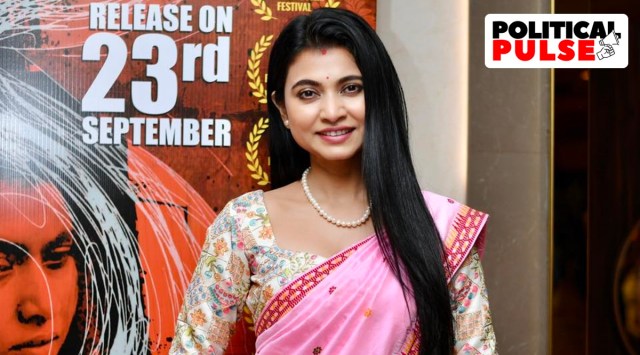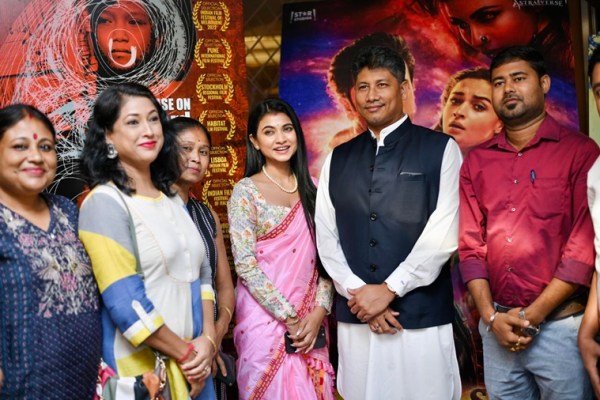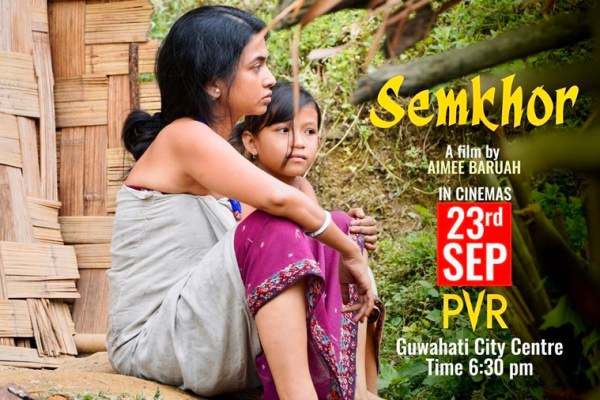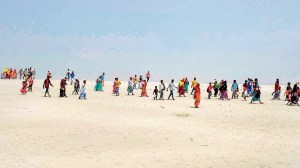- India
- International
Row brews over National Award film in Assam, community objects to portrayal
Filmmaker Aimee Baruah wife of an Assam minister; Dimasa groups write to President Murmu
 Aimee Baruah, the lead actor, director and producer of 'Semkhor'. (Facebook/Aimee Baruah)
Aimee Baruah, the lead actor, director and producer of 'Semkhor'. (Facebook/Aimee Baruah)A National Award winning film finds itself at the centre of a controversy in Assam, with organisations representing the Dimasa community accusing ‘Semkhor’ of “misrepresenting” its customs and “falsely” showing them as practising female infanticide.
The controversy has acquired political overtones as Aimee Baruah, the lead actor, director and producer of the film, as well as a well-known film personality, is the wife of the state Parliamentary Affairs, Water Resources, and Information and Public Relations Minister, Pijush Hizarika.
While the film had a theatrical release on September 23, it was subsequently pulled down by some cinema halls owing to the controversy.
With criticism mounting, Baruah tendered an apology on social media. “Although the plot line of my film Semkhor was created on the basis of information that we collected from newspapers, books, magazines and a few individuals, the fact remains that the story is completely fictional. It has never been our intention to hurt anyone’s feelings or self-respect through this film,” Baruah wrote on Facebook, adding that she only wanted to draw attention to “the beauty of the location, the local language, the attire and so on”.
Set in a small village called Semkhor, the film is based around the customs, traditions and livelihood of the Dimasas, who are largely based in the Dima Hasao district of Assam, apart from parts of Nagaland. It has been touring national and international film circuits since last year, and won the 68th National Film Awards for best jury mention and best feature film in Dimasa this July.

Since the beginning of this year, Dimasa groups have been calling for the film’s boycott. On September 29, the Jadikhe Naisho Hoshom, an apex Dimasa body, and several Dimasa student and youth groups wrote a joint memorandum to President Droupadi Murmu to stop further screening of the film. “The film has already been screened in many film festivals world-wide. Now the world knows us and our customs, traditions and livelihood through the lens of Aimee Baruah’s Semkhor and this is completely wrong,” the memorandum read.
 Aimee Baruah with husband and state Parliamentary Affairs, Water Resources, and Information and Public Relations Minister, Pijush Hizarika, and others. (Facebook/Aimee Baruah)
Aimee Baruah with husband and state Parliamentary Affairs, Water Resources, and Information and Public Relations Minister, Pijush Hizarika, and others. (Facebook/Aimee Baruah)
Demands in the memorandum include withdrawal of Aimee Baruah’s claims of “authenticity” regarding the film, an apology from Baruah, and compensation to the Dimasas for “defaming the customary morality” of the community.
One of the most controversial depictions in the film, as per the protesters, involves the killing of a child, played by a baby called Claring, in the film.
All Dimasa Students’ Union president Uttam Langthasa said Claring died later as she “was exposed to cold and rough weather at the time of production”. “They shot the film with an 84-day old baby. Some of the shooting was done near river Panimur. That time, the baby developed a cough and she died five days after (the shooting),” Langthasa said, adding that “none of the film’s artists, producers or director tried to help the family in any way after their loss”.
 A poster of ‘Semkhor’ (Facebook/Aimee Baruah)
A poster of ‘Semkhor’ (Facebook/Aimee Baruah)
Langthasa also called the film’s portrayal of female infanticide as “totally false,” adding that “no such custom is practised by the Dimasa community”. He demanded that the awards received by the film be withdrawn.
Langthasa also objected to the portrayal of animal sacrifice in the film. “It’s a custom like many others. To say we do puja for meat alone is such a blatant lie,” he said.
The Dimasa Mothers’ Association also said: “We, the Dimasas, have never had issues of such acts of gender discrimination nor have we ever seen or read it in any history of the Dimasas.”
Apr 27: Latest News
- 01
- 02
- 03
- 04
- 05








































